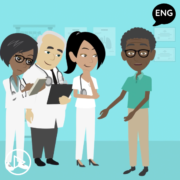Living With Prostate Cancer
Living With Prostate Cancer from Patient Empowerment Network on Vimeo.
What follow-up care is important for people with prostate cancer? This animated video discusses support and tools for managing life with prostate cancer.
See More From Shared Decision Making: Navigating Prostate Cancer Care
Related Resources:

|

Collaborating With Your Doctor on Your Prostate Cancer Care Plan |

|
Transcript:
Niki:
Hi! I’m Niki and I’m a nurse practitioner. And here with me is Anthony, who is living with advanced prostate cancer.
Anthony:
Thanks for joining us!
In this video, we’re going to discuss tools for managing life with prostate cancer.
Niki:
Living with prostate cancer means that patients will be monitored for signs that the cancer may be progressing, and assess if it is time to treat the cancer or consider a different treatment plan.
Anthony:
But for all patients, an important part of living with prostate cancer is follow-up care. This may include:
- Disease monitoring and managing symptoms and side effects,
- As well as emotional support.
- And, in some cases, creating a survivorship plan with your team.
Niki:
Let’s start with disease monitoring: This may include regular exams and testing to keep an eye on your disease progression or recovery. And your individual situation and risk will determine the frequency of your appointments.
Anthony:
And for patients like me who have had treatment, managing short and long-term side effects is an essential part of living with prostate cancer.
One issue that can be challenging for some prostate cancer patients is the impact of treatment on a patient’s sexual function and self-image.
Niki:
That’s right, Anthony. It’s important to note that there ARE options that may help manage certain side effects, but you have to talk about them with your healthcare team. While bringing up sexual side effects or bladder control issues to your provider may be difficult, it’s the only way your team can assist you.
Anthony:
In my case, I found it easier to communicate my sexual issues in writing, using the patient portal. Plus – don’t forget that care partners can be a resource to help bring up difficult topics.
Niki:
Exactly – utilize your resources and communicate in a way that you feel most comfortable!
And, as we mentioned, there can also be emotional side effects for men living with prostate cancer. Patients may feel stressed about their diagnosis or anxious about their cancer returning or progressing. Working with a health professional like a social worker, counselor, therapist, or psychologist may help reduce anxiety and worry.
Anthony:
Right – the other approach that really helped me emotionally was participating in a support group.
Support groups allow men to meet and interact with others who are living with prostate cancer and provide a platform to share experiences and information. In a support group setting, it may be easier for men to share details that they don’t necessarily want to share with loved ones.
Niki:
That’s a great point, Anthony. Studies show that participating in a support group can help cancer patients cope with anxiety and depression.
Anthony:
It certainly encourages me to know that other men are facing similar challenges. While my support group meets in person, there are online options for people who prefer to connect in a virtual setting.
Niki:
But as much as it can be reassuring, the support group format isn’t for everyone. Talk to your social worker or counselor about additional support options to find an approach that feels most comfortable to you.
Anthony:
Now that we’ve walked through disease monitoring and resources for emotional support, let’s talk about survivorship. Niki, what is a survivorship care plan?
Niki:
Sure. A survivorship care plan organizes your follow-up care. It may include:
- Information about the treatment you received.
- A follow-up schedule for exams and tests.
- A list of potential symptoms and side effects.
- And lifestyle recommendations to establish and to maintain healthy habits.
Your healthcare team, along with a care partner, can help you develop and stick to a plan.
Anthony:
That’s great advice, Niki. Now that we have learned some tips for living with prostate cancer, what can you do to participate in your follow-up care?
Niki:
- Make sure to schedule and keep regular visits with your team – including your general practitioner – so that all aspects of your health can be monitored.
- Report any new symptoms that you experience – no matter how small.
- Next, don’t hesitate to speak up about lingering side effects – including bladder and sexual side effects – so your team can identify solutions.
- And ask for emotional support and resources.
- Finally, if it’s right for you, talk with your doctor about a survivorship care plan.
Anthony:
Thanks for joining us! Be sure to download the guide that goes with this video to access the information we discussed.
And visit powerfulpatients.org/pc to access more videos with Niki and me.












